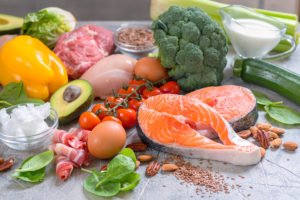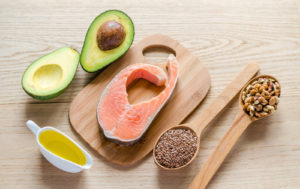Macronutrient Needs for Athletes
By Chris Newport, Nutritionist & Head Coach
Whether you’re a runner, cyclist or triathlete, proper training time and adequate recovery is key to improved performance. But to get the best quality out of that training and recovery, a nutritious diet is essential. However, there’s no one perfect diet for every athlete. In fact, everyone’s daily nutrition plan should be unique based on stage of life, training cycle & goals, personal preferences, lifestyle, genetics, lab results and more.

License to Eat?
So where do you start with good daily nutrition habits?
First, remember that being an endurance athlete doesn’t give you the license to eat whatever the heck you want. While exercise is certainly a healthy habit, it doesn’t make any athlete immune to health conditions. In fact, we commonly see endurance athletes with symptoms and blood markers related to excessive oxidative stress and inflammation. Regardless of your activity choice, eating well with real, whole foods should the rule, not the exception.
Macronutrient needs are individualized
All athletes need the right balance of macronutrients, or carbohydrates, protein and fat (and alcohol…but we’ll ignore that one for now). While it was once believed that endurance athletes should be eating the majority of their calories from carbohydrates, that’s no longer always the case. Some may do well adopting a very low carb ketogenic diet with 5-10% of their calories from carbs, while others need closer to 50% from carbohydrates. Again, every athlete’s needs, preferences and goals are different. Regardless, eating real, whole foods is best.
That’s why we developed The Fueling Edge, the only meal service that matches your macros with the mission to nourish athletes of all ages with healthy and delicious fuel tailored to their unique needs.
Choose the right carbs
What I tell my kids is no different than what applies to athletes: “eat your rainbow.” In other words, eat your veggies and fruits!

These carbohydrates provide critical micronutrients (aka vitamins and minerals), phytonutrients, and fiber that help an athlete’s body function optimally. Most people should aim to consume at least five servings or more of vegetables (1/2 cup cooked or 1 cup raw) and fruits (about the size of a baseball) combined per day.
Carbohydrates are a key source of readily available energy during exercise and can come from real food like dates, bananas, and rice or engineered products like sports drinks, gels, chews and bars. While many engineered products are conveniently packaged, they lack nutrients and can wreak havoc on an athlete’s health when used improperly. So skip the sugary carbohydrates and engineered products on rest days and for workouts less than one hour.

Protein matters
Most athletes need at least .5-1g of protein per pound of lean bodyweight (not necessarily total bodyweight), or approximately 15-30% of total calories from foods like lentils, grass-fed meats, organic dairy and low-mercury fish. Protein is responsible for the growth and maintenance of cells (since exercise breaks your body down on a cellular level), creating antibodies for immunity (so you get sick less and miss fewer training sessions), and supplying small amounts of energy. Plus, it helps preserve muscle mass for athletes trying to lose body fat.
Fat is fabulous
Dietary fat is an excellent source of energy and necessary for absorbing certain vitamins. It helps keep you full and maintains steady energy and focus throughout the day. Some athletes need as little as 25% of their calories from fat, while others need as much as 75%. Focus on plant and fish based sources of fat like avocados, olive oil, salmon, chia seeds, and almonds. This will allow your body to adapt to using fat effectively as a fuel source (check out our Fat for Fuel blog and Low Carb High Fat Diets for Female Endurance Athletes blog), reducing your reliance on high carbohydrate foods before, during and after exercise.

Hydrate for health
To maintain optimal daily hydration, drink water consistently throughout the day. If water is too boring, try unsweetened flavored seltzers, coconut water, or herbal iced or hot teas. You can even spice up your ice cubes with 5 Refreshing Things to Make Into Ice Cubes. Aim to urinate every few hours during the day with pale yellow urine.
Putting it all together
For example, many athletes training 1-2 hours per day often do well with about 20-25% protein, 35-45% fat, and 30-45% carbs. When workouts get longer and harder, you’ll burn more calories from glycogen reserves, or stored carbohydrates used for exercise. While daily nutrition needs may not change much, fueling and hydration needs will, which we determine using metabolic and sweat testing (aka our “Fueling & Hydration Formula”).
Whether you’re new to endurance sports or a seasoned veteran, take care of yourself by choosing real food in the right ratios for you for your best performance and recovery.
Need help determining your optimal macronutrient needs?
We can help! Schedule your free nutrition consult or call us at (919) 230-7897 to determine what services best fit your needs.



